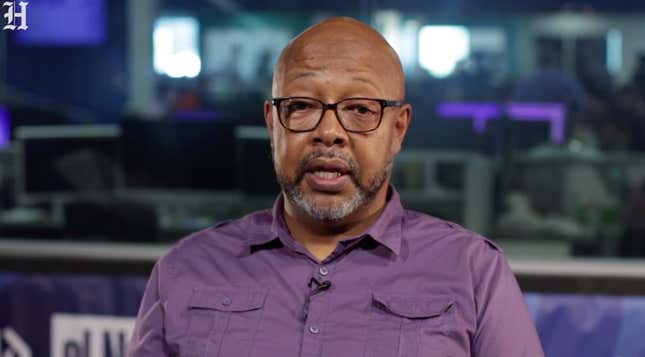
Leonard Pitts Jr., a Pulitzer Prize-winning columnist for the Miami Herald, was laying in his bed in Bowie, Md., early on Sunday morning when he woke up to a phone call. It was the police.
The police told him they received a 911 call that he had murdered his wife. They instructed him to come outside.
Pitts complied while his wife—who had been laying in bed right next to him—stayed inside. Pitts had been swatted, a dangerous prank in which a caller makes a false police report to prompt a SWAT team response.
On Tuesday, the veteran columnist laid out what happened in a new column reflecting on what it means that so many were surprised that he had survived the incident.
Pitts started by saying he hadn’t intended to write about the cops showing up at his door.
“Independence Day is Thursday, and I thought I might talk about the meaning of freedom in the age of Trump. Refugees are imprisoned in squalor on our southern border, the government balking at providing them toothpaste and soap, and I thought I might talk about the diminution of compassion in the age of Trump,” he wrote, adding that he felt “the story of how I ended up in handcuffs on my front lawn” had been told well enough by other media outlets.
“Then I thought of all the times panicky, out-of-control police officers have left unarmed black people traumatized, wounded and dead in the last few years,” Pitts continued. “And I thought of something people keep reminding me: My story easily could have had a much different ending.”
Pitts, who has written on a variety of topics but is best known for his columns on race, described in detail what he experienced last Sunday morning:
“I opened my front door into blinding spotlights and an amplified voice instructing me to drop my phone and walk forward, hands away from my body, then go down on my knees, whereupon I was cuffed and taken to stand behind a police cruiser,” he wrote. It took police about a half hour to resolve the situation and determine there was no crime.
Pitts described the incident as stressful and surreal, though, to his own surprise, he wasn’t scared.
“Once I understood what was going on, I felt reasonably confident everything would be fine if I remained calm and allowed police to figure things out,” Pitts writes. “It helped me, I think, that they themselves were calm. Nobody yelled or cursed at me. I wasn’t manhandled, and when it was over, I received an apology.”
It’s that surprise—his own, and the collective surprise that he was able to survive such an ordeal—that sticks with him, days after the event, he says. Pitts compares the outcome of his encounter with the police to that of Tamir Rice, Levar Jones, and Philando Castile.
There are, of course, many more that Pitts did not and could not possibly name. People like Sandra Bland, who survived her encounter with the cop that pulled her over, but not the three days spent in a Texas jail. Stephon Clark, killed just outside his family home. Botham Jean, fatally shot in his own apartment after an off-duty cop, Amber Guyger, intruded.
She mistook the home for her own, she claims.
They were all innocent—like him. All doing innocuous, unremarkable things. Yet they were killed and he—an alleged wife killer—was not, he notes.
“The fact that so many people regard that as a minor miracle is telling and sad. Sunday morning in a tense situation, police conducted themselves coolly and professionally. People should not have to be surprised by that,” Pitts wrote, concluding, “It should tell you something that they are.”

